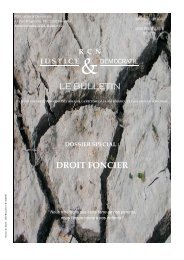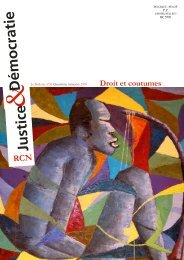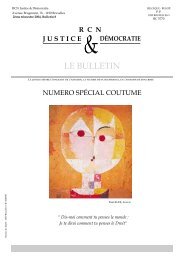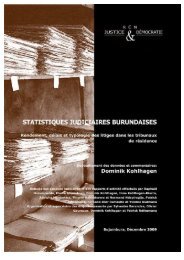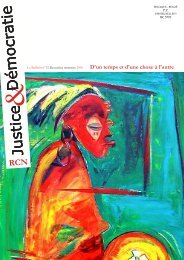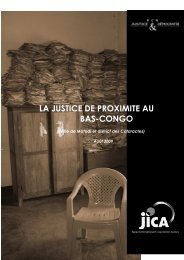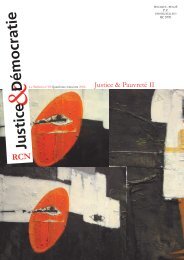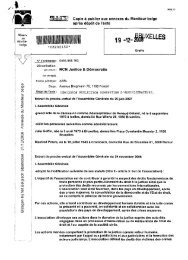Démocratie
extrait du bulletin n°25 - RCN Justice & Démocratie
extrait du bulletin n°25 - RCN Justice & Démocratie
You also want an ePaper? Increase the reach of your titles
YUMPU automatically turns print PDFs into web optimized ePapers that Google loves.
than most. My family is nearby and do what they can to<br />
help me, my children are well and I am learning to read<br />
and write. Things in Southern Sudan are changing<br />
slowly. I’m sure that one day I’ll be free.”<br />
Esther’s story is far from unique. As a result of the war,<br />
countless women of her generation have suffered the<br />
same fate. Some live in unhappy forced marriages like<br />
Esther’s, others are victims of sexual violence at the<br />
hands of men outside of the family unit. Today the one<br />
common theme for women like Esther is that there are<br />
many rigid barriers preventing discussions about the<br />
reality of their experience. Like many societies across the<br />
world, the subject of sex alone is taboo in Southern Sudan.<br />
Socio-culturally, and arguably religiously, it is often<br />
considered inappropriate to discuss sexual matters<br />
which are largely considered to be between a husband<br />
and a wife. Although there are some laudable aspects of<br />
customary law which give women and children legal<br />
protections, it is also evident that some aspects (or indeed<br />
interpretations) of customary law serve only to<br />
further disempower women. Add to this the all too<br />
common concept of shame attributed to sexual matters<br />
(particularly where a woman is concerned) and the<br />
problem becomes clear: with regards to their bodies,<br />
women have no voice with which to speak and protect<br />
themselves.<br />
When the Small Arms Survey conducted the Sudan<br />
Human Security Baseline Assessment in 2005-2007, in the<br />
sample group surveyed, it discovered that out of all violent<br />
crimes, sexually violent ones are the least reported.<br />
The under reporting is due to the imposition of shame<br />
upon a woman, the power imbalances between men<br />
and women and the resulting lack of support from society.<br />
The survey also discovered that there is a greater<br />
age differential between the perpetrator and the victim,<br />
suggesting that power once again plays a huge role in<br />
the problem of sexual violence. Additionally, the long<br />
term physical and psychological effects of sexual violence<br />
were found to be more severe than in victims of<br />
other violent crimes. Although this research is anecdotal,<br />
the existence of sexual violence in Southern Sudan’s<br />
war is undeniable. It is only in recent years, long after<br />
the most violent war years throughout the mid-late 80’s<br />
and 90’s, that the subject of sexual violence and war is<br />
being widely discussed in the international community.<br />
Further compounding the barriers faced by Southern<br />
Sudanese women is the lack of institutional ability to<br />
deal with the problem. One of the results of the civil<br />
war is widespread decimation of what already was a<br />
weak system of governance. The Southern Sudanese<br />
police force is still building its capacity to deal with their<br />
new found responsibility for a post-conflict region. Their<br />
remit is enormous. Despite all best efforts, the Judiciary<br />
of Southern Sudan is only now up to 50% capacity and,<br />
as a result struggles to deal with cases efficiently and<br />
effectively. Whilst the Government is fully committed to<br />
decreasing gender disparity – the CPA details how the<br />
Government intends to achieve equity starting with political<br />
empowerment for women – it is still difficult for<br />
changes to be seen on the ground. Chapter II of the CPA<br />
(Art. 1.6.1-1.6.2.16) specifically mentions the rights of men<br />
and women to, ‘[…] the enjoyment of all civil and political<br />
rights set forth in the International Covenant and Political<br />
Rights […] ‘<br />
At a grassroots level, Southern Sudan has numerous<br />
active women’s rights organisations ready to move forward<br />
and to speak the words which will bring healing to<br />
the country’s women and children. What is currently lacking<br />
is a legal framework to enable them to speak and be<br />
heard. In the absence of specific Southern Sudanese gender<br />
equity legislation, there is no legal mandate to enable<br />
women’s organisations to act on behalf of women.<br />
Although there is presently no specific legislation on sexual<br />
violence, the intention and spirit of the CPA is clear;<br />
women matter and women must be given a voice.<br />
As far as the international community is concerned,<br />
there is also a commitment to redress the balance between<br />
men and women. The United Nations has adopted<br />
Resolution 1325 on Women, Peace and Security. It recognises<br />
the importance of women in peace and security.<br />
The Resolution has been embraced by the Government of<br />
Southern Sudan and its international partners. Placing<br />
women’s rights at the top of the agenda together with<br />
security issues can only herald positive change and open<br />
up the dialogue regarding sexual violence.<br />
Creating the future<br />
Together with the communities, the Government of<br />
Southern Sudan and the NGOs already working to promote<br />
and protect the rights of women, the taboo about<br />
sexual violence can be removed. There is a need for dialogue,<br />
there is a need for the rebuilding of conflict resolution<br />
methods and, in due course, a need for communities<br />
to learn about the legal protections available to victims<br />
of sexual violence during and post conflict. And in<br />
healing the wounds, the perpetrators are also to be remembered<br />
because the violence which they have inflicted<br />
on others is not only debasing to them but sadly indicative<br />
of the underlying traumatic effects of war.<br />
Awak Bior,<br />
Project Coordinator in Southern Sudan.<br />
Footnote :<br />
(1) The name has been changed to preserve the anonymity of the victim.




